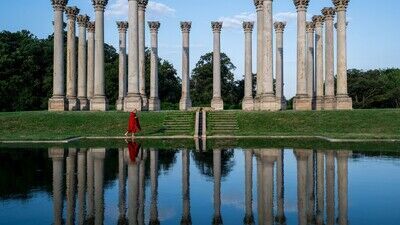
The only Palestinian film programmed for Berlinale is from a collective composed of Palestinian filmmakers Basel Adra and Hamdan Ballal with Israeli colleagues Yuval Abraham and Rachel Szor. It captures the destruction of a West Bank community whose origins can be tracked to the 1830s. While the filming of “No Other Land” began during Summer 2019, when Israeli courts ruled in favor of the expulsion and demolition of Basel’s village, Masafer Yatta — the struggle it depicts began much earlier. In fact, the Israeli order is coming after a 22-year battle in court by the inhabitants to save their homeland from being turned into a permanent site for Israel to practice tank maneuvers.
With widespread destruction presently happening in Gaza, it’d be far too easy to apply the usual buzzwords of “urgent,” “timely,” “critical,” or “imperative” to this bracing documentary. After all, as far as anyone can remember, the conflict between Israel and Palestine has raged. And yet, at this moment, in this specific phase, the graphic scenes of state-sponsored violence suppressing the desire to simply live hits with greater severity than ever before.
This is a tightly wound, eloquently composed text narrated by Basel and mostly filmed through his lens. There are horrific scenes of the IDF forcibly removing, occasionally with deadly intent, these unarmed inhabitants and even clearing out children from a school at gunpoint. There are also defiantly rendered instances of activists relying on protests to advance their cause. As tanks, bulldozers, and soldiers try to clear the area, the community takes shelter in the nearby caves. One of the directors, Yuval, an Israeli journalist sympathetic to the villagers’ cause, comes to report on the situation. And the story somehow finds graver stakes when Basel’s father is taken into custody.
Watching the harrowing images in “No Other Land,” often recalls what Gordon Parks said about the power of being a photographer: “I picked up a camera because it was my choice of weapons against what I hated most about the universe.” In the hands of these filmmakers the camera becomes a weapon for truth and resistance, and a tool for conservation — recording some proof that their village existed. It’s the latter impulse, as the filmmakers watch homes be cleared, neighbors shoved from their places of memory, and lineages destroyed, where “No Other Land” stands as a vital documentation of a people under siege. You hope that not only this film receives as much acclaim and attention as “20 Days in Mariupol,” a film similarly composed by on the ground journalists using images to awaken the world to their country’s plight but is also so effective that you needn’t apply the word “urgent” to it for too much longer.

